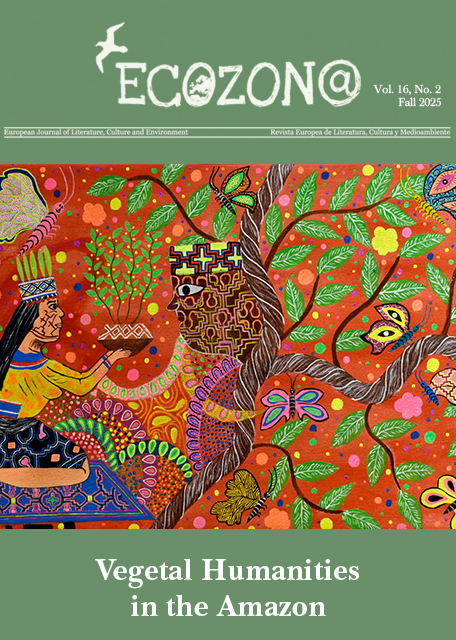Decolonial Interruptions of Settler Time in Tanya Tagaq’s Art
DOI:
https://doi.org/10.37536/ECOZONA.2025.16.1.5315Parole chiave:
Tanya Tagaq, political strategy, decolonization, Split Tooth, Inuit seal huntingAbstract
This article discusses two texts by the Inuit musician and writer Tanya Tagaq to demonstrate the need for honoring Inuit relationships with other-than-human beings through decolonial interruptions of settler time in Canada: a well-publicized photograph Tagaq posted on Twitter in March 2014 of her infant daughter beside a freshly killed seal, and the genre-crossing book Split Tooth. Using Walter Mignolo’s approach to decolonial gestures, I explore the #sealfie photograph and the novel as textured evocations of the Inuit worldview that was rendered invisible in much of the commentary on Twitter about the #sealfie picture. Both the #sealfie controversy and the book have larger ramifications for how the difficult process of reconciliation between Inuit communities and Canadian settlers is understood. Tagaq’s development of form, word, and image allow for reader responses within what Mary Louise Pratt calls cultural “contact zones” (1991) where small shifts in awareness of the continuity and dignity of continued Inuit presence on the land, despite colonization, are possible. In the first part of the article, I discuss recent historical and theoretical contexts, introducing Mark Rifkin’s approach to “settler time” as a theoretical lens. I then consider the #sealfie issue, focusing on how Tagaq transformed the attacks on her political stance and personhood as an Inuit mother. In the third part of the article, I expand my discussion to show how Tagaq transforms the epistemic terms of the debate through storytelling and poetry in Split Tooth.
Downloads
##submission.downloads##
Pubblicato
Fascicolo
Sezione
Licenza
Authors who publish with this journal agree to the following terms:
a) Authors retain copyright and grant the journal right of first publication with the work simultaneously licensed under a Creative Commons Attribution License that allows others to share the work with an acknowledgement of the work's authorship and initial publication in this journal (CC BY-NC for articles and CC BY-NC-ND for creative work, unless author requests otherwise.
b) Authors are able to enter into separate, additional contractual arrangements for the non-exclusive distribution of the journal's published version of the work (e.g., post it to an institutional repository or publish it in a book), with an acknowledgement of its initial publication in this journal.
c) Authors are permitted and encouraged to post their work online (e.g., in institutional repositories or on their website) prior to and during the submission process, as it can lead to productive exchanges, as well as earlier and greater citation of published work (See The Effect of Open Access).










